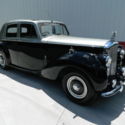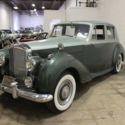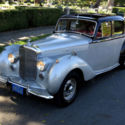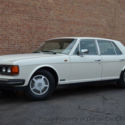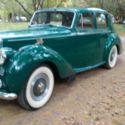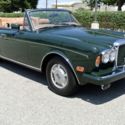Documented history, older restoration, sunroof, ready for BDC tours and events
| Make: | Bentley |
| Model: | Other |
| SubModel: | Park Ward |
| Type: | Sedan |
| Year: | 1938 |
| Mileage: | 72,722 |
| VIN: | B75LE |
| Color: | Tan |
| Cylinders: | 6 |
| Fuel: | Gasoline |
| Transmission: | Manual |
| Interior color: | Tan |
| Vehicle Title: | Clear |
| Item location: | Macedonia, Ohio, United States |
1938 Bentley Other Additional Info:
From the dawn of the automobile to the start of World War I, Europe and the United States were on the same path: affordable small cars and monstrous road locomotives for the very wealthy. But after World War I, things changed in Europe, and while America got bigger, more powerful automobiles designed for absolute silence and comfort around town, Europeans enjoyed smaller, more efficient cars designed to travel long distances at high speeds. By the end of the 1930s, the definition of luxury had changed considerably depending on which continent you were standing, but one thing remained true no matter where you were: quality mattered. And few could define quality better than Rolls-Royce, whose acquisition of Bentley in 1933 brought a leaner, more sporting model into the showrooms: the 4-1/4 Litre Derby Bentley.
By the time this lovely 1938 Bentley "Four-and-a-Quarter" Litre saloon was built, the jokes about W.O. Bentley building the "world's fastest lorries" were well and truly done. The 4-1/4 was thoroughly modern and designed to cross Europe at high speeds in total comfort and safety. It was innovative the way Bentley always was, with what Rolls-Royce engineers called a "side-mounted" camshaft, dual carburetors, redundant ignition and fuel systems, and robust 12-volt electricals. If you failed to arrive at your destination in a Bentley, it certainly wasn't the car's fault.
The marriage to Rolls-Royce brought refinement as well as access to the finest coachbuilders in the world. This particular 4-door saloon was a catalog model with a body by Park Ward, long a Rolls-Royce partner in the finest tradition. Sweeping fenders, a hood that appears to be as long as a city block, and a handsome bustle-back trunk with rear-mounted spare make the car look as if it's in motion, pushing forwards against the wind. This car received a comprehensive frame-off restoration that included a bare-metal respray in the 1990s, and the complementary two-tone beige and cream coachwork highlights the subtle elegance of the design. Among its many wonderful features are a sliding sunroof, massive Bentley headlights and a traditional chrome grille with Flying B hood ornament, and retractable trafficators in the B-pillars, pre-dating Buick's adoption of turn signals in the US in 1939. Streamlining is happily merged with old-world formality, giving the Bentley a sleek look that's appealing from any angle and thanks to quality work during the restoration, none of the old world craftsmanship is lost. All four doors close with a reassuringly solid THUNK, the hood swings on well-oiled hinges, and the car feels robust as it goes down the road. All the chrome trim, and there's a surprising amount of it, was refinished to show standards and still looks fantastic today. Yes, the car has been extensively driven and toured, but that's the point of owning a Bentley and I'll wager that if you contact most owners of the Bentley Driver's Club, they'll say that a little bit of road wear is a badge of honor, not a demerit.
Parked next to, say, a Packard of the same vintage, the Bentley will look small but that's completely intentional. Big cars are more challenging to make into fast cars, and the Park Ward bodywork cleverly provides plenty of comfort for four passengers on a long journey, so don't be fooled by its size. Front seat occupants are treated to a pair of supportive buckets that wrap around your shoulders, almost as if they were anticipating energetic driving in the car's future. Fragrant tan leather hides are used throughout and they have acquired a pleasant patina that only leather can provide, inviting without being tired. There's natural burled walnut everywhere you look, from the window sills to the dashboard, which is filled with dials, switches, and knobs for the driver. The original instruments are all fully functional, including the tachometer (or rev-counter in the familiar parlance), and show bright markings and clear lenses after all these years. Other knobs control the ignition, the fog lamps, the instrument lights, and a switch for alternating between the two electric fuel pumps, both of which are fully operational. Trafficators are controlled by the large flipper switch in the center just below the windscreen, and headlights are managed by the flipper switch adjacent to the ignition. Controls for the spark retard, mixture, and throttle, as well as the adjustable shock absorbers, are on the hub of the steering wheel and it won't take long to become familiar with their operation. Both the shifter for the 4-speed manual transmission and the hand brake are to your right, just against the cowl, and it does take a bit of a reach, but it will not take you long to become accustomed to getting it right. Besides, the big Bentley six makes so much torque that you won't need to shift all that often.
In back, you'll be pleasantly surprised by the space available. Clever footwells offer the legroom of a much larger car, so it's easy to get comfortable if you're under about six feet tall. The sunroof slides back manually, allowing in a great deal of light and only a light breeze, and there's a clever little shade over the rear window that's controlled by a loop of string over the driver's door. The trunk is large and nicely shaped, and this particular car includes a pair of fitted suitcases for travelling, which still leave room for additional baggage. It also carries its original hub wrench, jack handle, and tool roll, although the tools are now stored in a very tidy panel built into the passenger's front kick panel. There's also a small canister full of replacement light bulbs. The spare tire, of course, is mounted outside in a metal cover.
Rolls-Royce engineers wasted no time adding horsepower to the Bentley, punching out the former 3.6 liter inline six to 4.25 liters, which also increased top speed from 90 to 96 MPH. Reliability was uncompromised and it remained true to its name of "the silent sports car." A massive aluminum crankcase has a cast iron cylinder block on top, and in Bentley fashion, there is no cylinder head, it's all a monoblock casting. Exhaust ports are integral with the block, although it does use an intake manifold for the twin side-draft carburetors. There's a massive intake silencer on top (which we call an air cleaner) and the most wonderful array of tiny bell cranks and levers to manage the controls on the steering wheel. Twin ignition coils are of a modern type for reliability (the originals are notoriously prone to overheating and failure) and the voltage regulator is a cleverly hidden Delco unit (likewise), but those appear to be the lone modifications to the original spec. Both fuel pumps on the cowl operate correctly (it's actually one fuel pump with two separate motors) and all of the wiring and plumbing in the car was replaced during the restoration. Richen the mixture as suggested on the steering wheel, add some throttle, and hit the starter button and the big six barks to life with ease and settles into a smooth 900 RPM idle. Once it's warm, you can kick it down even more, where it will happily sit in the heat without getting fussy at all.
On the road it's simply a joy, and it's here that you can see why Bentley enthusiasts prefer to drive rather than show. The machinery is just brilliant, with smooth clutch take up and well-chosen gears in the 4-speed manual gearbox, so the car can pull through them without interrupting the smooth flow of torque. Acceleration feels effortless in almost any gear and it cruises comfortably at modern highway speeds. Perhaps most remarkably, the front suspension is still a rigid axle supported by leaf springs, but it works so well, you have to wonder why they would try anything else. Leather gaiters are wrapped around the springs to keep them from squeaking and getting dirty, and there are powerful finned drum brakes at all four corners. The exhaust system uses no fewer than three separate mufflers to get the perfect sound, and it's worth noting that the entire setup was crafted from stainless steel by Borla, a project that cost more than $2000 all by itself. Yes, there are plenty of signs of use underneath, plenty of road grime, and even some leaking oil, but everything works as it should making the sleek sedan feel well-lubricated and very precise. Painted wire wheels are an elegant choice and they are wrapped in recent 6.50-18 Firestone blackwall tires that look appropriate.
This Bentley carries serial number B75LE and has a mostly known history and its original engine, serial number A5BH. Documentation includes extensive historical information including original sales information, service records, and information cards, all put together in a bound volume. The car's history following the war is not known, but it surfaced in New Jersey in the late 1950s, eventually passing through the hands of noted Rolls-Royce collector Joe Loecy. It ultimately landed in the current owner's hands where it underwent a full restoration, which is documented with photographs and receipts. Since completion, the car has been a frequent participant in club events and long-distance tours and appeared as the cover car for the Derby Bentley Society's publication "On The Road."
This is a fantastic opportunity to own a sorted, ready to enjoy Derby Bentley with dramatic bodywork at a very appealing price. If you're already a Bentley enthusiast, there's little more that I can tell you. If, however, you're new, you will find this to be a wonderful example that needs little more than a new owner to be enjoyed. It is not perfect, it is not a show car, but like all great Bentleys, it drives superbly which is what it was designed to do from the start. Call today!




